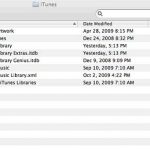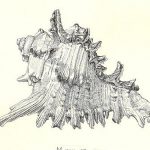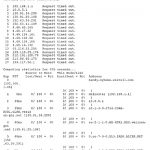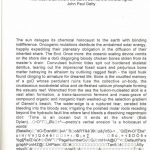Between Play and Politics: Dysfunctionality in Digital Art
Marie-Laure Ryan
Marie-Laure Ryan argues that dysfunctionality in new media art is "not limited to play with inherently digital phenomena such as code and programs," and provides a number of alternative art examples, while also arguing that dysfunctionality "could [also] promote a better understanding of the cognitive activity of reading, or of the significance of the book as a support of writing."
R. M. Berry’s Riposte to Brian Lennon and Loren Glass
R. M. BerryR.M. Berry responds to Brian Lennon and Loren Glass by noting the crucial differences between the various forms of institutionalization that are endemic (or should be considered so) to their conversations on "The System."
Roderick Coover, Larry McCaffery, Lance Newman and Hikmet Loe: A Dialogue about the Desert.
Roderick CooverRoderick Coover, Larry McCaffery, Lance Newman and Hikmet Loe explore the question of how desert ecologies are shaped through creative expression and actions. They consider, among others, how works by Edward Abbey, Robert Smithson and William T. Vollmann offer models for engaging ecological questions through writing and art.
Ebooks, Libraries, and Feelies
Daniel Punday
Countering the persistent popular notion that electronic literature is just reading the classics under glass, Daniel Punday advocates for greater innovation, and more authorial autonomy, at the level of book design. Insisting on "authors' rights to design the interface through which readers encounter their books," Punday argues that digital book publishing should strive to emulate the medial status of games, "which remain messy individuals."
Glass Houses: A Reply to Loren Glass’s “Getting With the Program”
Brian LennonBrian Lennon weighs in on developing conversation about Mark McGurl's Program Era; Lennon's response to Loren Glass's riposte argues that Bourdieu's work is invoked by Glass as an answer, not a question, "without any effort to mark...why or how Bourdieu might be right - and without leaving any sense of the debates that generated and refined Bourdieu's positions."
Forgetting Media Studies: Anthologies, Archives, Anachrony
Paul BenzonThrough a close formal analysis of two new critical collections, Paul Benzon ponders the state of media studies as field. Exploring the material and temporal paradoxes of anthologizing new media and posthumanism, he argues that "each of these texts takes shape, succeeds, and fails under the pressures and possibilities posed by the scalar demands of information."
Getting with the Program: A Response to Brian Lennon
Loren GlassLoren Glass argues that Brian Lennon’s review of The Program Era is a “symptom of the very crisis he so ruthlessly anatomizes.” Glass suggests Lennon’s review exaggerates the anti-institutional quality of Mark McGurl’s work while displaying its own anti-institutional bias against naming “the System” it describes.
Gaming the System
Brian LennonIn the wake of massive shifts in the function and purview of the University in the late twentieth and early twenty-first centuries, Brian Lennon considers two recent texts on the system of higher educational institutions and the academic practices that supports it.
Charles Darwin: Conservative Messiah? On Joseph Carroll’s Literary Darwinism
Bruce ClarkeBruce Clarke reviews Joseph Caroll's Literary Darwinism and (like Laura Walls in her review of E.O. Wilson ten years earlier in ebr)identifies the LD project not as "consilience" so much as the
colonization of the literary humanities by one branch of the biological sciences. In Caroll, Clarke discerns a Darwinian fundamentalism to match the Christian fundamentalism that can be observed in Clarke's own Lubbock, TX habitat.
Beyond Representation: Deliberate Reading in a Panarchic World
Laura Dassow Walls
Laura Dassow Walls explores how 'deliberative' reading practices may allow us to weigh the words we hear against the world we cognize - keeping alive the possibility of reading as a moral act.
Strange Sympathies: Horizons of Media Theory in America and Germany
John Durham PetersJohn Durham Peters outlines "the media studies triangle," which consists of textual, social, and institutional approaches. He then stakes out another approach that considers what civilization itself has at stake in media change.
Global Warming, Globalization, and Environmental Literary History
Lance NewmanLance Newman suggests Ecocriticism shares a problematic assumption with "green" capitalism: the idea "a livable future will result from billions of individual ethical decisions." Here he traces a burgeoning critical alternative that investigates the historical connections between global capital and the shifting structures of the "ecosocial."

